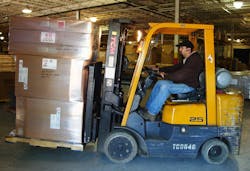Las Vegas. Congressional inaction on the “fiscal cliff” - expiration of tax cuts and automatic budget reductions scheduled to take effect in January - is creating overall economic uncertainty that could limit GDP growth to under 2% next year and limit freight growth, according to Bob Costello, chief economist of the American Trucking Assns. (ATA).
“It is very likely that Washington simply punts resolving the issues surrounding the cliff into 2013, thus limiting GDP growth to less than 2% until late in the year,” Costello said during a panel discussion during ATA’s Management Conference and Exhibition.
As a consequence of that uncertainty, he predicted that freight volumes “will for the next few months go sideways overall, with bright spots in some sectors like tank trucks.”
If, however, there is a resolution in the next few months, growth could exceed 2%, he said. And if “the overall economy were to surprise us on the upside with, say 3% GDP growth for several straight quarters, we would not have enough trucks to handle the corresponding increase in freight,” Costello told ATA members.
“Things will tighten up pretty quickly,” he said, because the economic uncertainty has made fleets “hesitant to add capacity.”
Since December large truckload carriers have only added 1% to capacity and LTL carriers 1.5%, while small TL carriers have actually contracted capacity by 0.5%, according to Costello.
Taking a broader global view, panelist Gregory Daco, senior economist at IHS Global Insight, said: “The U.S. economy looks like the best horse in the international glue factory.” If the fiscal cliff uncertainties were to be removed, he predicted “a number of quarters of medium growth” for the U.S.
Beyond economic uncertainties, Costello said one of the biggest issues facing carriers in the near future will be replacing an aging fleet. “Equipment is becoming the industry’s new diesel fuel,” he said.
It used to be that sharply rising fuel prices would lead to a jump in the number of carriers leaving the industry, Costello explained. Now sharply rising prices for new trucks with advanced emissions controls, combined with much lower residual values for older equipment will create “a pressure point” next year that could lead to a slow but steady increase in carriers going out of business, he said.
About the Author
Jim Mele
Jim Mele is a former longtime editor-in-chief of FleetOwner. He joined the magazine in 1986 and served as chief editor from 1999 to 2017.
